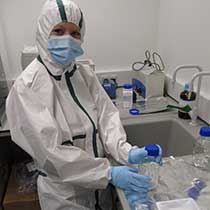Profile of Jessica Thomas

- Name
- Jessica Thomas
- Position
- PhD Student
- bsp20a@bangor.ac.uk
- Phone
- Location
Profile
Throughout my life I have had a strong interest in and passion for wildlife ecology, management and conservation which has now led me to discover and develop a particular interest in molecular ecology and conservation genetics. In October 2013 I began a PhD studentship at Bangor University, for which I am working in the field of ancient DNA and using the past to help address current and future conservation issues. Before moving to Bangor I was based at the University of Glamorgan (University of South Wales) where I obtained a BSc Hons in International Wildlife Biology and an MRes for my project entitled “A Population Genetic Study of Manta birostris and Mobula Species”. Travel is a huge passion of mine and both during my degree and personal life I have been fortunate to visit and work in some incredible destinations. I have carried out field work within the U.K., South Africa and Indonesia, as well as conservation work in Australia. I also love sharing my passions with others and have been able to do this through educational roles as an hourly paid lecturer at the University of Glamorgan and also as the DNA Course Leader for Operation Wallacea, running a field lab located in the Cloud Forests of Honduras.
Research
Project title:
Investigating the influence of environmental change on species extinction
Principal investigator(s) of project(s):
Dr. Michael Knapp (Bangor University)
Co-investigator(s) of project(s):
Prof. Gary Carvalho (Bangor University)
Prof. Michael Hofreiter (The University of York, Potsdam University)
Dr. John Stewart (Bournemouth University)
Prof. Tom Gilbert (University of Copenhagen)
Funding body:
NERC PhD Studentship
Current Research Project:
My PhD research in ancient population genetics focuses on species-environment interactions in different ecosystems and the influence of environmental change on species extinction. It consists of several individual projects. For example, I am interested in the influence of climate warming on cold adapted marine bird species such as the Great Auk. The Great Auk is a cold adapted sea bird that went extinct in the 19th century. While overhunting has likely caused its extinction, whether or not its disappearance was facilitated by stress through increasingly warm and less favourable habitats is unknown. Using a combination of palaeogenetic and palaeoenvironmental data, this project aims to reconstruct spatial and temporal population dynamics of the Great Auk and correlate them with environmental change and increasing exploitation by humans. By integrating data from archaeology, palaeoclimatology, genetics and population biology, this multidisciplinary project will provide a powerful framework to assess the relative importance of environmental change and human hunting in the extinction of the Great Auk. The project will also help identify population genetic features characteristic for a species under immediate threat of extinction, therefore supporting conservation efforts for other arctic and subarctic bird species.
